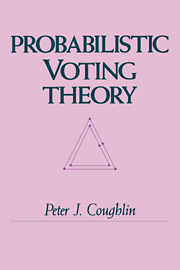Book contents
- Frontmatter
- Contents
- Acknowledgments
- 1 Majority rule and models of elections
- 2 Income redistribution and electoral equilibria
- 3 Properties of the redistributional equilibria
- 4 A more general election model
- 5 Concave social and candidate objective functions
- 6 Directional, stationary, and global electoral equilibria
- 7 Epilogue
- References
- Index
1 - Majority rule and models of elections
Published online by Cambridge University Press: 05 November 2011
- Frontmatter
- Contents
- Acknowledgments
- 1 Majority rule and models of elections
- 2 Income redistribution and electoral equilibria
- 3 Properties of the redistributional equilibria
- 4 A more general election model
- 5 Concave social and candidate objective functions
- 6 Directional, stationary, and global electoral equilibria
- 7 Epilogue
- References
- Index
Summary
Democratic nations settle the question of who should hold various public offices by holding elections. The answers provided by the electoral process strongly influence the public policies that the people in these countries end up living with. As a consequence, public-choice scholars are interested in the implications of the choices that voters can be expected to make for the choices made by elected public officials and by politicians who would like to get elected. Among the most important choices of elected officials and office-seeking politicians that are affected by what they believe about the voters' choice behavior are the positions that they choose on the leading policy questions of the day and the way in which they allocate their campaign resources. The first includes their positions on taxes and budget deficits, the appropriate levels of government expenditure on alternative programs, various possible pieces of social legislation, and many other matters. The second includes how they spend their campaign funds and how they spend their time during the campaign. As a consequence, various public-choice scholars have developed and analyzed models of the relation between the choices that public officials and office-seeking politicians make and the choices that they expect the voters to make.
Because of the nature of the institutions that are being studied and the variety of problems that have been addressed, the research on these models has (not surprisingly) been multidisciplinary, drawing on concepts and methods from economics, mathematics, political science, psychology, statistics, and other fields.
Information
- Type
- Chapter
- Information
- Probabilistic Voting Theory , pp. 1 - 24Publisher: Cambridge University PressPrint publication year: 1992
